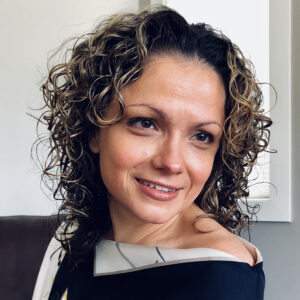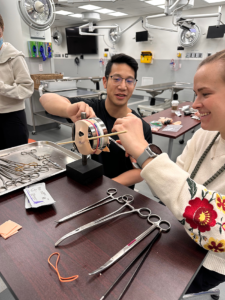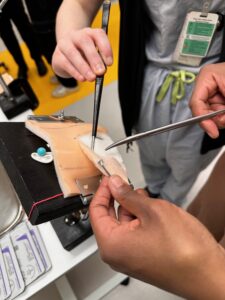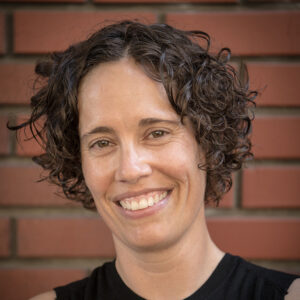Evidence-based learning models and ongoing evaluation is helping to encourage a culture of continuous learning and coaching. This research is supporting the medical community in producing excellent surgeons ready to meet the challenges of their profession while improving patient care.
In order to safely and efficiently perform surgical techniques, clinicians who practice surgery need to develop and hone their skills in the operating room. Being an excellent surgeon goes beyond technique. It also involves effectively communicating with the operating room team, adapting to changing scenarios, thinking critically in high-pressure situations, and supporting the next generation of surgeons. To meet the needs of the next generation and their patients, Advancing Health surgeon–scientists Drs. Roxana Geoffrion and Jane Lea are leading their surgical specialties in developing new training paradigms.
Using models to train medical residents
Technological advancements in residency programs have significantly enhanced surgical training where practice models play a role in developing surgical skills. Dr. Roxana Geoffrion, Program Director of the Advanced Training Program in Female Pelvic Medicine and Reconstructive Surgery in the Department of Obstetrics & Gynaecology at UBC, notes that these models historically did not come with a formal evaluation on whether or not they are effective teaching tools. In response to this, Dr. Geoffrion not only developed a model for vaginal surgery training, her team also developed a pass-fail score system for each model. This scoring system was able to distinguish between trainees who were learning the procedures and those who were already proficient in those procedures.

While knowledge and technical skills can be more straightforward to teach and assess, important characteristics like resilience, adaptability, and effective communication in the operating room are harder to define and impart. “Experts often struggle to break down their intuitive decision-making processes into teachable segments,” said Dr. Geoffrion. “So, having a model with a clear pass-fail score can help educators recognize that the trainee has reached a certain level of technical skill and can be more attentive to non-technical skills.”
Another important aspect of training new surgeons is the need for honest feedback in learning environments, where residents can accept criticism constructively and strive for continuous improvement. This iterative process of receiving feedback and applying it is essential for developing both surgical skills and related traits.
Feedback is not only important when training surgeons, it is also valuable in assessing the tools used in their training. As part of Dr. Geoffrion’s research, residents were asked to evaluate the usefulness of the new surgical model. They found the model to be quite useful and helpful for learning and practicing the surgical techniques.

“Training surgeons involves supervised practice where educators have to be very sensitive to individual learning styles and be able to recognize which skills are developing well and which skills need more attention,” said Dr. Geoffrion.
By defining these competencies and incorporating them into training programs, clinician–scientists can better prepare surgeons for the demands of their profession. Standardized assessments ensure that all trainees are evaluated fairly and consistently, promoting a consistently high level of skill and professionalism.
“It’s very important to us to train future surgeons who are both technically skilled and have the right attitude, which includes being compassionate. This means treating the whole person as opposed to just executing a surgical procedure,” said Dr. Geoffrion.
The intersection of traits and training
Surgeons require patience and perseverance to maintain focus throughout longer procedures while maintaining physical and mental stamina to perform well in the operating room’s high-stakes environment. As surgeries can often be intimidating experiences for patients, having empathy and compassion while clearly communicating surgical procedures and the possible impacts of those procedures are also important. These qualities help surgeons manage the stress and unpredictability of the operating room, work effectively within a team, and ensure the best outcomes for patients.
Moreover, the ability to accept feedback and continuously strive for improvement is a hallmark of a surgeon striving for excellence, especially as new technologies and adapted techniques are regularly introduced into the field. This mindset of constant learning and adaptation is vital for long-term success in the field, so by embracing feedback and using it to refine both their technical and non-technical skills, surgeons can continually enhance their performance and patient outcomes.
However, once a surgeon has successfully graduated from their training, it becomes their personal responsibility to seek out guidance and mentorship to continue improving their skills.

Unlocking potential: Peer-to-peer coaching
Surgical education does not end with residency. Continuous learning and improvement are essential for maintaining high standards of patient care. Low-fidelity simulation models, which are simplified versions of a surgical scenario to practice a procedure on, are valuable tools for future surgeons early in their training, but once those technical skills are established, surgical coaching can help hone and improve skills throughout a surgeon’s career.
Peer-to-peer surgical coaching involves a unique model where a coach (a peer surgeon with coach training) is either a silent observer in the operating room for a peer (coachee) or provides coaching by reviewing surgical videos after an operation. The coaches assist with goal setting, provide feedback, and develop action plans for improvement tailored to the coachee’s needs, both before and after the surgery. Coaching is not for remediation, but rather to further develop skills for all surgeons— even high performers benefit by continuing to embrace the process of improvement. Sessions with the coach are tailored to the coachee’s goals, emphasizing areas they wish to improve which ensures that coaching is personalized and relevant. Coaching helps unlock a person’s potential, optimizes performance, and positively impacts non-technical skills such as interpersonal skills, cognitive skills (decision making, judgement, situational awareness) and self-regulation (stress response, coping strategies), and can also improve physician retention and resilience and reduce burnout.

Dr. Jane Lea, an Otolaryngologist Head & Neck Surgeon specialized in Otology & Neurotology, created a coaching program in collaboration with UBC CPD and funded by a Royal College Grant for both surgeons and anesthesiologists to participate in peer-to-peer coaching. “Many other performance-based professions have coaches. There are coaches for the performing arts, sports, and executive leadership,” she said. “But coaching is not yet mainstream in medicine and much needs to be done to create a culture that encourages and accepts this as a valuable aspect of continual professional development for physicians and surgeons.”
But how do patients feel about their surgeons needing coaching?
Beyond competence: Perceptions of surgeon coaching
Dr. Lea conducted research evaluating patients’ attitudes towards surgical coaching. Although the majority (84%) of patients welcomed the idea of their surgeon having a coach, there were still several that had concerns and were skeptical about the need for a surgical coach. Some patients felt it was unnecessary for a surgeon to have a coach because they already undergo such intensive medical training. Others felt that the coach may distract their surgeon or were concerned about coach–surgeon dynamics. However, after a brief intervention explaining the rationale for surgical coaching, acceptance among patients improved to 96%.
“There is still a culture among surgeons of not asking for help or worrying that having a coach will be perceived as a weakness by either colleagues or patients,” said Dr. Lea. “This mentality can come from many years of training towards ‘competence,’ embracing the idea that one is now ‘good enough.’”
Dr. Lea also noted that there is also a pervasive surgical culture that being vulnerable or exposing weaknesses are linked to inadequacy. This is likely compounded by the historical fallacy that surgeons are infallible, which adds unrealistic pressures to live up to. Dr. Lea says that this can lead hiding areas that they would like to improve instead of addressing them. “Competence is often the benchmark that leads to graduation, but health care is a field constantly striving to improve patient care and outcomes, with physicians working towards that shared goal,” she said. “This is difficult to do alone. To improve, physicians, including surgeons, need to take the brave step of being open to being coached by a peer, to bring those hidden areas of possible improvement into view.”
“The brave physician or surgeon open to coaching is one that is continually improving; if I was a patient, I would wish for my treating doctor to have a coach,” Dr. Lea emphasized, “I think physician coaching should be celebrated and not shunned, but this will take a culture shift. Where there is vulnerability there is growth. The culture needs to shift beyond competence.”
Dr. Lea says that perceptions may be changing; her research has found that younger patients (25–45 years old) supported the presence of a surgical coach, recognizing the benefits that coaching would have for their surgeon and improve their surgical outcome. Feedback collected from a small sample of both coaches and coachees of the surgery program found that, not only was the experience helpful, there was an improvement in both technical and non-technical skills that were incorporated into practice.
Encouraging continuous learning
Despite a cultural hesitance to seek feedback, the benefits of continuous learning — such as improved decision-making, stress management, and interpersonal skills — are clear. Encouraging a culture where seeking coaching is normalized can help surgeons enhance their performance to ensure better patient outcomes. Learning does not need to stop just because formal surgical training has been completed.
“Surgical training is done with the utmost respect for patients and safety. It’s very important to produce a generation of surgeons who are not only highly skilled, but also have the right attitudes and the compassion and care to treat the whole person,” emphasized Dr. Geoffrion.
Learn more about Dr. Geoffrion’s training models by watching her Work in Progress seminar.



